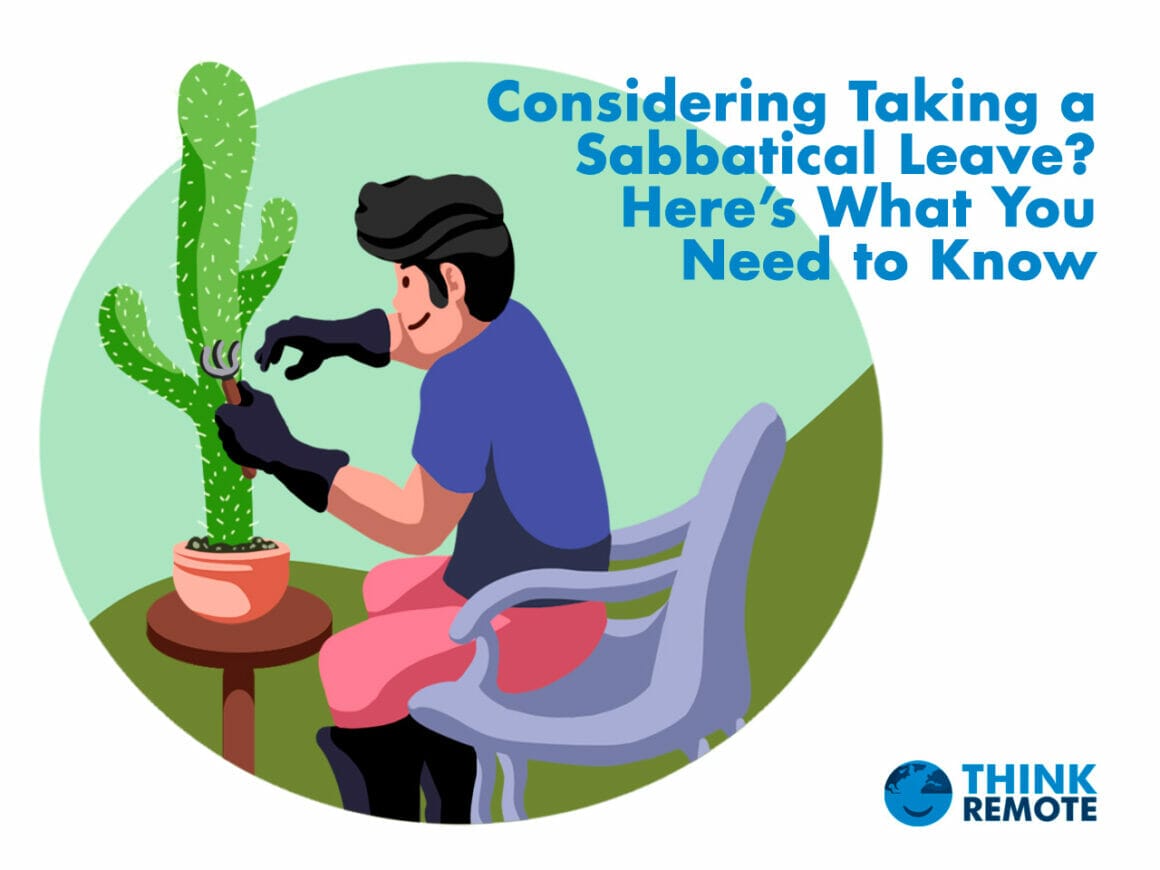“All work and no play makes Jack a dull boy.” Jack should consider taking a sabbatical leave. And you should too.
While the idea of a ‘rest day’ or a ‘Sabbath’ is as old as the Old Testament, the concept of a sabbatical leave in modern work culture is relatively new. Once reserved for a few university professors, the idea of a sabbatical has now spread to most parts of every industry.
What is a Sabbatical?
A sabbatical is an extended period of paid leave from work, allowing employees to rejuvenate, work on other projects and unwind. It is a win-win situation for both the company and the employees. Employees often come back with greater vigor and better ideas to work.
In this post, you’ll learn why you need to take a sabbatical leave, things to keep in mind, its rules, and also a few disadvantages of sabbatical leave.
But first, let’s bust some myths about sabbatical leave.
Myths About Sabbatical Leave
1. Remote Work/ Digital Nomadism is a Sabbatical
Many non-remote workers feel that remote work or digital nomadism is a sabbatical from a hectic 9 to 5 job. But this is not true as remote workers and digital nomads are full-time workers who’ve opted for flexible work schedules. You’d know what we’re talking about if you’re a remote worker. Remote work is a lifestyle choice, not a break from work.
Remote workers and digital nomads are in just as much need of a sabbatical as a typical 9 to 5 office goer.
2. Sabbatical = You’re Not Focusing on Work.
There is a common misconception that Sabbaticals are taken by those who hate their work or are not passionate about it.
The truth is, a sabbatical is an indispensable part of your work life. You need to maintain a good work-life balance to work efficiently. Continuous work cannot compromise your mental health, family time, or even a journey of self-discovery.
Sabbaticals allow you to focus on your work more than before, not the other way around.
3. Sabbatical is an Unnecessary Leave of Absence
This myth stems from the misconception that sabbaticals are long paid vacations to exotic locations.
While long vacations are an aspect of sabbatical leave, it’s not the complete picture. In most cases, employees taking sabbaticals participate in other productive activities like returning to school, community service, and working on the body and mind.
The positive impact of a sabbatical applies not just to the employees but to the company as a whole.
So here are a few reasons why you should consider taking a sabbatical leave.
5 Reasons Why You Should Take a Sabbatical
1. Mental Health
You need some time off from your busy schedule.
Unlike your yearly holidays, sabbaticals allow you to unplug from work altogether. You don’t have to answer emails or attend meetings. You’ll have all the time for yourself, giving you ample time to work on your mental health by taking up meditation or connecting with nature.
2. Learn an Important Skill
Go back to school to learn something new, join a new course or try to upskill yourself. The skills you may choose to learn needn’t be directly related to work. It can even be something you always wanted to know but never found the time for.
3. Time to Pursue your Passion
You might love being a computer engineer, but your passion may lie in gardening. For most of us, our work and passion may not align. And that’s perfectly fine.
A sabbatical lets you temporarily take a leave from the job that you love and work on your other passions. It enables you to work on your projects like writing a book, building a backyard garden, or teaching underprivileged kids.
4. Rethink Professional Pursuits
A sabbatical can be a perfect time to re-evaluate career goals and trajectories. You can pause and introspect about what you can do to be a better version of yourself. You can even consider looking for other avenues of work and talking to people about it.
5. Makes Room for Family
If you’re highly ambitious in your professional pursuits, there’s an unfortunate tendency to overlook family time. A Sabbatical is convenient to plan some family time and unwind as a family together.
You can even take a sabbatical for other personal reasons. But remember not to take it for granted. It would be best if you utilized a sabbatical optimally. So, here are three things you should keep in mind before taking a sabbatical.
3 Things to Keep in Mind Before Taking a Sabbatical
1. Plan Your Sabbatical
An unplanned sabbatical can turn out to be unproductive and a disaster. It may not give you the change that you wish to see. You might come out of it disappointed with yourself and more sluggish than before.
Yes, a sabbatical gives you the much-needed pause. But even a break must be planned to use it best.
Here are a few tips to plan your sabbatical:
- Figure out why you want to take a sabbatical.
- Then, start listing the things you always wanted to do but never found time for due to work.
- Come up with a budget.
- Make a priority list for your ideas based on your interest and budget.
- Start booking tickets or apply for courses that you want to do.
- Plan your day so that you have enough time for family and friends.
- Make sure to give yourself enough time to meditate and rejuvenate.
2. A Sabbatical is Not an Escape Route
If you hate your job, a sabbatical will not solve it. What you need is a change of workplace or work stream. A sabbatical only gives you time to think about what to do. It’s not the end of all work-related woes.
3. Assess Your Finances
Yes, ideally, sabbaticals need to be paid. But, this is not an ideal world. Ensure your finances are strong if your company doesn’t pay you during your sabbatical. Keep a tab on how long you can go on without pay. Try to make a daily/ weekly/ monthly budget to plan your spending.
While a sabbatical is a right in most workplaces, there are a few rules to be followed (even if your employee handbook doesn’t have it).
Rules of Taking a Sabbatical
1. Don’t Keep Your Employer in the Dark
Before you go on your sabbatical, clearly mention the extent of your absence, your date of joining, and other vital details. Remember that someone else needs to do the job if you’re not doing it. So, it is essential to let your managers know the details well in advance. It’ll allow them to plan the work flow accordingly.
2. Find a Replacement
Look for someone who can temporarily manage your tasks while you’re away. Let them know all the details and make sure they’re not overburdened. Train them to handle your work so that output quality is not compromised.
Here’s a ProTip: Divide your work into sections and give each section to different co-workers. It makes sure that no one person is burdened with extra tasks.
3. Don’t Leave Mid Way
If you have a task to complete, don’t leave yet. An unfinished task is confusing and often is a headache for your co-workers to finish it. Make sure you finish all pending projects before you take a sabbatical.
Yes, a sabbatical is your right, but also remember to be compassionate and responsible.
4. Don’t Moonlight
We’re not saying that moonlighting is unethical. But, if you’re moonlighting under the pretext of a sabbatical, you’re cheating your employer. Moreover, moonlighting doesn’t serve the purpose of your sabbatical. You may not be able to unwind, relax and learn.
A sabbatical has many benefits. From better mental health to improved work efficiency, it can be a gem in your work life. It gives you the much-needed family time and time to work on your passions. But, it may also have a fair share of disadvantages.
Disadvantages of a Sabbatical
- Meeting financial obligations may be difficult if you’re taking an unpaid sabbatical. If you’re a freelancer, a sabbatical means a definite loss of income.
- You might miss out on a big opportunity at work.
- It takes time to transition from the comfort of a sabbatical to work life.
- Finding a new job can be challenging if you take a sabbatical between jobs. It is especially true if there’s an unfortunate market downturn.
However, in most cases, the benefits of a sabbatical outweigh its disadvantages. If you’re looking for a healthy work-life balance, a sabbatical is one of the many tools to maintain it.
FAQs
1. What’s the difference between a sabbatical and a leave of absence?
A sabbatical is an extended period of leave. While a leave of absence may not necessarily pertain to an academic reason, sabbaticals tend to be productive academically. Further, sabbaticals are breaks specifically taken to relax, unwind and learn.
2. Is taking a sabbatical a good idea?
Yes, taking a sabbatical is a good idea if you have your finances strong. It helps you take a step back from your fast-paced life and work on things that are dear to you.
3. What companies offer sabbatical leave?
While start-ups are too small to offer paid sabbaticals, many grown-ups like Charles Schwab Corp, Adobe, Intel, PayPal, Deloitte, Autodesk, and others offer paid sabbaticals. But if you’re a freelancer, taking a sabbatical depends on your financial situation and flexibility.
4. Should you take a year off work for mental health?
A sabbatical is the best way to work on your mental health. You can take professional help and work on yourself. The gap will give you enough time to reflect and understand your life.
Last Advice
All work and no play make Jack a dull boy. But “all play and no work makes Jack a mere toy.” So, remember to plan your sabbaticals and stay productive. The idea is to unwind, relax, have fun, and learn.






